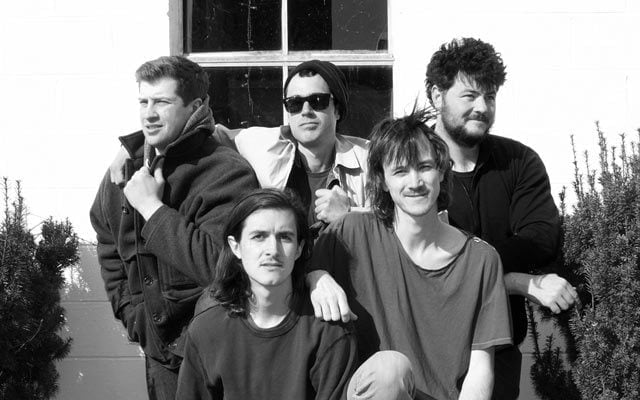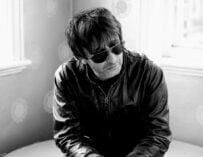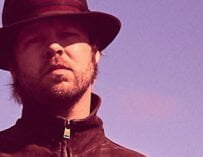
The Felice Brothers: “We quit everything we were doing and went for it!
The songwriting linchpin of the upstate NY alt-country band, Ian Felice talks of sibling collaboration and recording on a farm
Celebrating 10 years together as a band, upstate New York rockers The Felice Brothers now comprise Ian Felice on guitars and vocals, his brother James on accordion, keyboards and vocals, Greg Farley on fiddle and Josh Rawson on bass. The third musical brother, Simone had been the drummer as well as a vocalist and a guitarist, but left the group in 2009 to lead his own band, The Duke & The King and collaborate with the likes of The Lumineers. Meanwhile, The Felice Brothers have stayed true to their DIY ethic, continuing to produce their own distinct brand of ramshackle Americana from a rented garage-studio on a working farm in Hudson Valley.
Their recently released new album, Life In The Dark finds the band’s lyricist, Ian, continuing to explore modern life in a complicated and divided America – through a cynical and occasionally heartbroken lens – in the tradition of songwriters like John Prine, Shane MacGowan and Michael Hurley. As was postulated in our recent review, the collection of nine songs are a “healthy dose of gnarly alt-country and everything you want from The Felice Brothers,” and they certainly piqued Songwriting‘s interest.
So we caught up with Ian on the farm, to take us back to the genesis of the sibling-based collective, explain their stripped-down creative approach and tell us more about the new record…
You’ve been a band for 10 years now. Take us back to the beginning of the story.
“I’ve been writing songs since I was a kid, probably like 13 or 14 years old, but the genesis of the band happened in probably 2006. I’d written 10 songs and recorded them, just me playing the acoustic guitar. It was called Iantown and that was basically the beginning of the band, because I got my brothers James and Simone together and decided to devote our lives to it. We quit everything we were doing and went for it!”
Were you and your brothers already playing music together, or had you been doing your own thing?
“Yeah we had played some music together – me and Simone had made a record before that. We had a small band right out of high school. But James was playing piano with a different band – he was 18 or 19 so he had just got out of school as well. I was studying painting in New York, living in Brooklyn, so I was mostly painting but then I’d write songs for fun, as a hobby. But then it switched around and I started studying songwriting and making that full-time.”
Was music an important part of your family upbringing for all three of you?
“I think some of it had to do with that. I don’t know… we all just loved music; it spoke to us. What the songwriters said just made sense to us and it was kind of like figuring out how to live your life. There’s a lot of good advice in the song, so I think we were just very moved by that kind of music – those poetic songwriters of the 60s and 70s, like Woody Guthrie and stuff.”
Thinking back through the evolution of the band and your discography, how did things develop? When did you start writing as a band and did your creative process have to change?
“The process has always been solitary – we hardly ever write songs together. The bones of the song are brought by the songwriter – the person who’s singing it – then we play on it and try to improve it… produce it, I guess. I can’t write in company either. I need to be completely alone. It takes a long time for me figure out what the hell I’m trying to say! I can’t just go into a room and go, ‘Okay, give me a pen and paper, I’ll just write these lyrics down.’ I don’t really write lyrics like that – I’ve got to go and walk in the mountains for a couple of days.”
Do you need to start with an idea of ‘what you’re trying to say’ or can you ever just jam it out?
“I think, generally, the beginning of the song comes very easily – I’m playing guitar and I’ll just sing the first couple of lines. Then once you get to that point, and you have to try to finish it, that’s the hard part.”
Is it just the guitar that you write with?
“No, I write on the piano as well.”

The Felice Brothers: “We recorded in the winter, so there’s not much to do round here… other than be depressed!”
You recorded your new album in an old chicken farm. Was that your first choice of location?!
“Well, that’s where we rehearse and we’ve had that spot for a few years. It’s like a concrete garage. We decided to record there because we didn’t have much of a choice! We wanted to do it ourselves and we wanted it to be as homely as possible, so we didn’t want to go into a studio and waste money. We just wanted to try to do everything by ourselves. We didn’t bring in a producer or engineer or anything, so it was just us, in a room, doing it all. I think that was what we wanted to do and it made sense to do it there, because that’s where all our stuff was and the room didn’t sound that bad.”
Is that different to how you’d normally approach an album?
“No, that’s very similar. We’ve only really made one record in a studio. We always like to make our own spaces, but we usually bring in a friend, Jeremy Backofen, who is an engineer and producer. So James’ biggest job on this record was to engineer us, because he was the technological person who did all the recording. I mean, we don’t understand it all! He’s got a brain for that kind of thing, so he figured it out and then of course interpreted the songs and had ideas for arrangements. Josh and Greg’s job was to help arrange – it was like four producers in the room.”
Was it easier to have that extra freedom and control over the sound of the record?
“I think it came pretty natural because we’ve done some things like that in the past. It was one less person’s opinion was a good thing, because we wanted to keep it as simple as possible. So I think it was the right choice and worked out pretty well.”
What was your typical day like on the farm, when you were making the album? What did you do when you stopped recording?
“It’s where I live basically, but we spend a lot of time outdoors. There’s a lot of hiking. We recorded in the winter, so there’s not much to do round here… other than be depressed!”
Tell us about some of the new songs that are particularly poignant.
“Jack At The Asylum, I guess, is a reaction to living in the modern world, turning on the news and being freaked out by how fucked up it is! That was a basis of a lot of love songs, but that one is pretty explicit, lyrically. With Triumph ’73, I liked the image of the motorcycle, just someone in transition, from one point in their life to another point, and I just wanted to capture the image of him passing through. That what I was trying to talk about lyrically, but I don’t know how that works out.
“There are a lot of different themes on the record. Not consciously. I try not to get over-analytical, but I think there’s a lot frustration with the state of the human. It’s the same old shit!”
Do you still paint and express yourself creatively in that way, or is it all about ‘painting’ a story with the music now?
“Yeah, I do paint, but it’s hard to do both. You have to work everyday to get okay at it. So I don’t know, I would love to do more painting, but right now I’m just trying to make the process of writing and painting the same thing, so it doesn’t matter what I’m doing. But it’s really difficult.”
Looking forward, are you thinking about your next album and where you’re going as a band?
“Oh yeah, I always do. I try to write every day, for six hours, so I’ve been trying to write for the next record. Because we finished this record over a year ago, I have a lot of new ideas. I never listen to records and I constantly try to move forward – that’s how I keep my head above water. So I keep writing; it’s part of my daily routine. I need some kind of routine to keep my head distracted, I guess.”
What is that routine?
“When I wake up, I drink some coffee and try to start working by about nine o’clock – and working means reading a lot or trying to write. Then I take a lunch break and keep working, then I usually go for a long walk in the evening. Then my wife gets home from work and it’s all over!”
Interview: Aaron Slater
The new album Life In The Dark is out now on Yep Roc Records and The Felice Brothers have announced a European tour to kick off at the beginning of 2017. For more on Ian and the band, visit: thefelicebrothers.com


































Related Articles